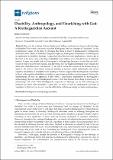Files in this item
Disability, anthropology and flourishing with God : a Kierkegaardian account
Item metadata
| dc.contributor.author | Cockayne, Joshua | |
| dc.date.accessioned | 2020-04-15T16:30:02Z | |
| dc.date.available | 2020-04-15T16:30:02Z | |
| dc.date.issued | 2020-04-14 | |
| dc.identifier | 267341610 | |
| dc.identifier | 577f508e-13a4-491c-90d0-a28b9ccb5adf | |
| dc.identifier | 85083336487 | |
| dc.identifier | 000533909900019 | |
| dc.identifier.citation | Cockayne , J 2020 , ' Disability, anthropology and flourishing with God : a Kierkegaardian account ' , Religions , vol. 11 , no. 4 , 189 . https://doi.org/10.3390/rel11040189 | en |
| dc.identifier.issn | 2077-1444 | |
| dc.identifier.other | ORCID: /0000-0002-1545-8247/work/72360929 | |
| dc.identifier.uri | https://hdl.handle.net/10023/19805 | |
| dc.description | Funding: This research was funded by the Templeton Religion Trust, grant number 58801. | en |
| dc.description.abstract | How can the writings of Søren Kierkegaard address contemporary issues in the theology of disability? For while it is surely true that Kierkegaard had ‘no concept of “disability” in the contemporary sense’ of the term, I will argue that there is much in Kierkegaard’s writings that addresses issues related to disability. I begin by exploring Kierkegaard’s discussion of suffering and its application to disability theology. I argue that while this has some application, it doesn’t get to the heart of the issue, since a theology of disability must address more than the issue of suffering. Instead, I argue, we should look to Kierkegaard’s anthropology because it is here that we find a vision of what it is to be truly human, and, therefore, how we might understand what it means for those with disabilities to be truly human. To do this, I outline the account of the human being as spirit in The Sickness Unto Death, noting its inability to include certain individuals with severe cognitive disabilities. A straightforward reading of Sickness suggests that Kierkegaard would think of those with cognitive disabilities as similar to non-human animals in various respects. Noting the shortcomings of such an approach, I then offer a constructive amendment to Kierkegaard’s anthropology that can retain Kierkegaard’s concern that true human flourishing is found only in relationship with God. While Kierkegaard’s emphasis on teleology can be both affirming and inclusive for those with disability, I argue that we need to look to Kierkegaard’s account of ‘neighbor’ in Works of Love to overcome the difficulties with his seemingly exclusive anthropology. | |
| dc.format.extent | 15 | |
| dc.format.extent | 303724 | |
| dc.language.iso | eng | |
| dc.relation.ispartof | Religions | en |
| dc.subject | Kierkegaard | en |
| dc.subject | Anthropology | en |
| dc.subject | Disability | en |
| dc.subject | BL Religion | en |
| dc.subject | B Philosophy (General) | en |
| dc.subject | GN Anthropology | en |
| dc.subject | T-NDAS | en |
| dc.subject.lcc | BL | en |
| dc.subject.lcc | B1 | en |
| dc.subject.lcc | GN | en |
| dc.title | Disability, anthropology and flourishing with God : a Kierkegaardian account | en |
| dc.type | Journal article | en |
| dc.contributor.institution | University of St Andrews. School of Divinity | en |
| dc.identifier.doi | https://doi.org/10.3390/rel11040189 | |
| dc.description.status | Peer reviewed | en |
This item appears in the following Collection(s)
Items in the St Andrews Research Repository are protected by copyright, with all rights reserved, unless otherwise indicated.

